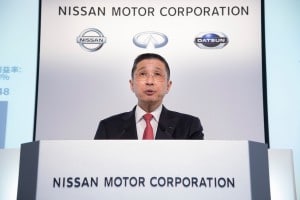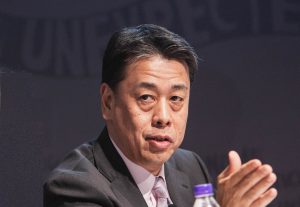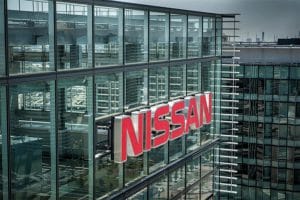
Nissan CEO Hiroto Saikawa seems to have hoisted by his own petard, brought down by role in creating the Ghosn scandal — and poor sales and earnings.
Former Nissan CEO Hiroto Saikawa, who tendered his resignation late last year after being caught up in a corporate corruption scandal, will have to make due with a parting payout of $3 million, the Japanese automaker’s board has decided.
That might seem reasonably generous under the circumstances – which include not only the ongoing corruption scandal that also brought down Nissan Chairman Carlos Ghosn but also saw a collapse in earnings. But the 66-year old Saikawa was originally expected to get $15 million as a lump sum payout. And he no longer will be allowed to remain a paid “consultant,” which will cost him additional cash and benefits.
Meanwhile, the tenure of Saikawa’s successor as CEO is increasingly uncertain. After reporting a $237 million loss and an 18% slump in sales during the most recent quarter, Makota Uchida found himself facing hecklers during last week’s annual shareholder’s meeting at Nissan headquarters in Yokohama, the executive saying he was willing to accept being fired if he couldn’t turn things around soon.
It’s difficult to say exactly when things started heading south for Nissan but the automaker’s crisis can readily be dated back to November 2018 when Carlos Ghosn, the man widely credited with saving the automaker from bankruptcy two decades earlier was arrested after his corporate jet landed in Tokyo. The Brazilian-born executive was accused of a variety of counts of financial corruption stemming from an internal probe Saikawa had launched earlier in the year.

Makoto Uchida could be a short-lived CEO, saying he was willing to be fired if he can’t reverse Nissan’s failing sales and earnings.
(Nissan anticipates more trouble ahead after big quarterly loss.)
Among the initial charges, Ghosn was accused of concealing millions of dollars in income. In one of the many ironies connected with the case, it was later revealed that Saikawa had also been overpaid, albeit to a smaller amount. He subsequently agreed to reimburse the automaker and step down. Notably, Saikawa also was not charged with a crime, unlike Ghosn who wound up spending four months locked in a tiny, unheated cell in the Tokyo Detention Center.
Ghosn has repeatedly proclaimed his innocence, most recently during a news conference in Beirut last month following his daring escape from Japan where he had been held on a tight leash since obtaining bail. Ghosn claimed fleeing Japan was “the most difficult decision” he ever faced, but insisted he could not receive a fair trial in the country.
He also insisted that he was targeted as part of a coup meant to wrest control of Nissan away from foreigners and, in particular, French automaker Renault which had financed the turn-of-the-millennium bailout of the Japanese automaker. Saikawa was widely criticized for his role in the probe and what followed.
(After fleeing from Japan, Carlos Ghosn speaks out for the first time.)
In another irony, Saikawa had risen to the CEO post after four decades with Nissan by becoming one of Ghosn’s top lieutenants. He was widely expected to follow his mentor’s policies, even pressing for closer ties to Renault.
While being caught up in the corruption scandal was the official reason behind Saikawa’s departure, it was clear that he had lost board and shareholder support even before his overpayments were uncovered. The 66-year-old executive struggled to cope with declining sales and earnings. With demand plunging he defied conventional wisdom, trimming incentives and boosting prices, especially in the critical U.S. market. The situation only grew worse, as the red ink during the October-December quarter underscored. That was Nissan’s first quarterly loss since 2009.
Since Saikawa stepped down in September, however, the chaos at Nissan has only grown worse. Other senior managers, including one directly tasked with overseeing turnaround efforts, have resigned. Reports from Japan have hinted at strife among those who remain.
The automaker is hoping to roll out an assortment of new and updated products over the coming year that can help reverse its sales and earnings slide. If not, Uchida could soon follow Saikawa out what has become a revolving door at Nissan’s Yokohama headquarters.
(Nissan prepares to offer buyouts to US employees as cost-cutting accelerates.)

